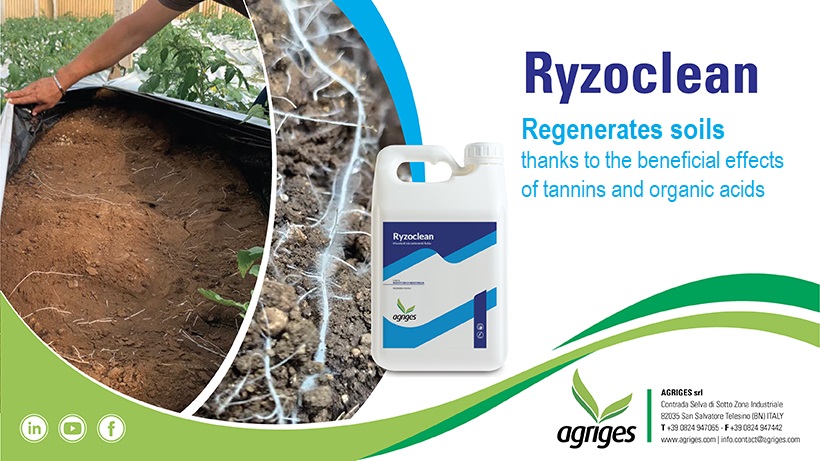Horticultural transplanting: how to improve crop health with Ryzoclean
As spring approaches, it is necessary to prepare for new sowing or transplanting of tomatoes, peppers, aubergines, potatoes, strawberries, melons and other fruit, leaf or bulb vegetables in open fields, greenhouses, or tunnels.
A widespread problem, especially in horticulture, is the increasing difficulty in obtaining qualitatively-quantitatively satisfactory production without a known and easily identifiable cause. More and more often at the root of this type of difficulty is the problem of 'soil fatigue' generated by excessive use of mineral fertilisers, deep soil working, irrational irrigation, but above all replanting and monoculture, factors that reduce the quality of agricultural soils with inevitable repercussions on crop productivity and production quality. Therefore, a modern and integrated approach is needed to address this issue, seeking to preserve and improve soil fertility so as to ensure ideal conditions for crops and improve plant welfare over time.
Ryzoclean: Regenerating Soil to Improve Crop Quality
As part of an integrated strategy to restore the quality of agricultural soils, the use of formulations that improve the physical, chemical and biological characteristics of the soil, making it more hospitable to plant development, can be very useful.
This is the case of Ryzoclean, a formulation based on plant extracts characterised by a high tannin content, in which the plant extracts undergo thermal breakdown and, as they degrade, lead to the formation of various more or less complex organic molecules. These include many classes of compounds including aldehydes, ketones, alcohols, organic acids, esters, furans and pyranes, phenols and tannins.
Thanks to its special formulation, Ryzoclean acts both indirectly and directly on the plant.
Among the indirect effects, we can identify:
- The increase in organic matter content in the soil;
- The acidifying action on soil pH;
- The restoration of soil suppressiveness
- The increase in the soil microbiome
There are many direct effects on the plant and these have been evaluated over time thanks to Agriges' collaboration with trial centres, research centres and universities, which have found that Ryzoclean positively influences various agronomic parameters such as plant vigour, root mass and production of the various crops considered belonging to the Solanaceae, Cucurbitaceae, Liliaceae and leafy vegetable families.
Significant results were also found when investigating the physiology of the plant.
In the presence of unfavourable abiotic factors and under conditions of oxidative stress, crops of agricultural interest are not able to express their genetic potential to the full, leading to reduced yield and economic problems. It is therefore necessary to act to reduce the oxidative state of the plant.
To this end, thanks to collaboration with CREA, which stands for 'Council for Research in Agriculture and Analysis of Agricultural Economics', the content of bioactive compounds in Ryzoclean-treated plants was evaluated in comparison to untreated plants, and the studies carried out show a statistically significant increase in the concentration of polyphenols, flavonoids (antioxidant molecules) and the entire antioxidant activity.
This is closely related to the plant's enzyme activity, in particular the enzymes involved in the detoxification of ROS (Reactive Oxygen Species) that can cause severe oxidative damage especially to DNA, lipids and proteins. It is therefore necessary to rebalance the oxidation process by counteracting the negative effects of the excessive presence of ROS.
Studies show that in plants treated with Ryzoclean there is increased activity of enzymes such as:
- Superoxide dismutase (SOD) involved in the dismutation of ROS into H2O2
- Catalase (CAT), Guaiacol peroxidase (GPX) and Ascorbate peroxidase (APX), which convert H2O2 in H2O.
This suggests that, thanks to Ryzoclean treatment, when stress occurs, the enzymes involved in the various ROS detoxification steps are activated to counteract the negative effects of ROS and improve the wellbeing of the crop.
Ryzoclean, like every Agriges product, is born out of the rigour of scientific investigation, respect for the environment and the operator, and is the practical answer to specific field problems.

Click here and download the Technical Data Sheet



